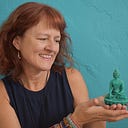Flow on the Baking Show
I’m taking some courses on positive psychology both for self-enrichment and as research for a next book I wish to write.
Martin Seligman, founder of positive psychology, came to these ideas when he served as president of the American Psychological Association. Psychologists and psychiatrists use a text called the Diagnostic and Statistic Manual when treating clients to find the appropriate diagnosis not only to create a treatment plan but in order to file insurance paperwork. The full title of the DSM includes the words “of mental disorders,” the notion being that someone must have a disorder of some kind in order to avail themselves of psychological treatment.
Seligman wanted to shift the perspective from what is “wrong” with people to what is right and how psychology could work to help people reach their potential. Rather than focusing on problems, the notion is to look for strengths to cultivate through scientifically proven interventions.
Though positive psychology has been accused of glossing over problems and telling people to smile, the goal is not to ignore problems but rather to re-orient toward what is working and how our character strengths can help us to be more resilient.
One measurement of well-being is something Seligman calls flow. When we are engaged in meaningful work that leads to total absorption in the moment, we are in flow.
And I realize that though I generally don’t enjoy reality TV or competitions of that nature, flow is why I love The Great British Baking Show (as it’s billed in America).
Normally, such shows make me anxious. I have second-hand anxiety as I worry over whether dough will rise, the oven temperature is correct, and meringue will be firm enough.
Perhaps it’s a stereotypical British “keep calm and carry on” or clever editing, but many of the bakers (often ones who make it to the final) are in the flow and take me there with them.
The first season that appeared on Netflix (and that I watched multiple times) included Richard, who brought his construction skills to his pastries, the unflappable Nancy, who always had a solution for her mistakes, and Luis, who had a childlike joy and incredible precision.
On one episode, the cool as cucumber Nancy explains she will be using the microwave for her first prove while judge Paul glares at her, making no impression on Nancy who has practiced and is experiencing flow.
When Richard gets something wrong, which happens more than once, he shrugs, grins, at one point says “Scooby Doo,” and keeps making his eclairs.
When Luis leaves the dried fruit out of his dough for the fruit bread he is supposed to be making, he rolls the dough out, adds in the dried cherries, and jokes around with host Mel. (Luis, alas, passed away in 2020; his congenial spirit and sweetness are a great loss.)
Sure, all of the contestants were competitors wanting to win and who felt stress at times, but each exemplified “a state of utter, blissful immersion in the present moment” as Seligman puts it.
It appears a pattern across seasons: the bakers who are experiencing flow will stay calm and are more likely to win.
I’ve been lucky enough to experience this state also. When I wrote my book, Jane Austen and the Buddha, I would be working on it and suddenly scold myself with, “You need stop and do some work now” before remembering, “oh, wait, I guess this is work.”
Flow is really a state of mindfulness, being fully present, but it is different in that we can be mindful no matter what the task, whether it’s something we enjoy or not. Flow means that we’ve found something we love and we’re doing it with all our being, hence the joy.
So whether it’s baking, writing, dancing, running, yoga, swimming, sewing, or any task from your daily life or work, go with the flow and see if it increases your sense of well being.
